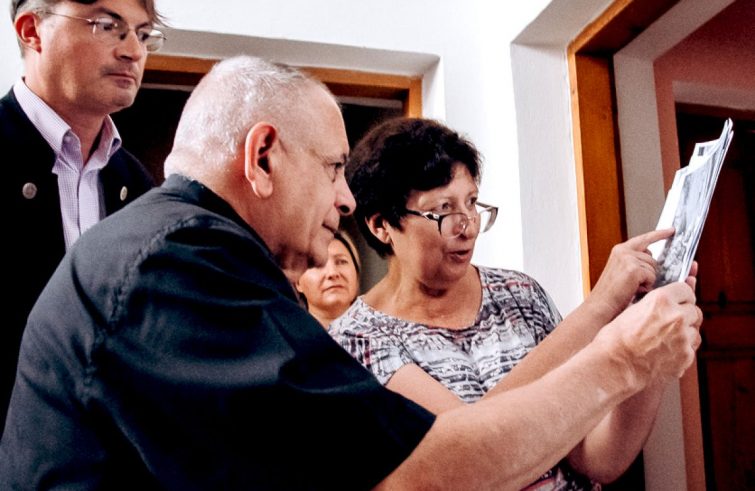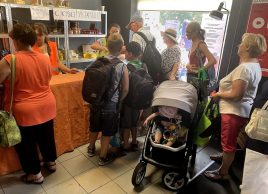
 The Catholic Response for Ukraine (CR4U) Working Group brings together all Catholic Church organisations actively engaged in providing humanitarian aid to Ukrainian war victims. Members include Caritas Internationalis, the Jesuit Refugee Service (JRS), the ICMC, the Sovereign Order of Malta, DePaul International, the Knights of Columbus, Stella Maris, CCEE and COMECE, acting on behalf of Europe’s Bishops’ Conferences. “Shortly after Russia’s attack on Ukraine – Monsignor Robert Vitillo, General Secretary of the International Catholic Migration Commission (ICMC), told SIR – at the invitation of the Holy See’s Migrants and Refugees Office, the Church’s humanitarian organisations worldwide convened in the Vatican to discuss the situation and exchange thoughts on on-site activities. On that occasion we decided to form this working group with the aim of continuing the exchange of information and experiences and in order to share challenges and needs so as to determine who can intervene and where.” Following his recent trip to Poland and Ukraine, Msgr. Vitillo participated in a dialogue meeting with members of the European Parliament (Art. 17, Tfue) in Brussels concerning the humanitarian response to the war in Ukraine on Tuesday, July 12 – via COMECE.
The Catholic Response for Ukraine (CR4U) Working Group brings together all Catholic Church organisations actively engaged in providing humanitarian aid to Ukrainian war victims. Members include Caritas Internationalis, the Jesuit Refugee Service (JRS), the ICMC, the Sovereign Order of Malta, DePaul International, the Knights of Columbus, Stella Maris, CCEE and COMECE, acting on behalf of Europe’s Bishops’ Conferences. “Shortly after Russia’s attack on Ukraine – Monsignor Robert Vitillo, General Secretary of the International Catholic Migration Commission (ICMC), told SIR – at the invitation of the Holy See’s Migrants and Refugees Office, the Church’s humanitarian organisations worldwide convened in the Vatican to discuss the situation and exchange thoughts on on-site activities. On that occasion we decided to form this working group with the aim of continuing the exchange of information and experiences and in order to share challenges and needs so as to determine who can intervene and where.” Following his recent trip to Poland and Ukraine, Msgr. Vitillo participated in a dialogue meeting with members of the European Parliament (Art. 17, Tfue) in Brussels concerning the humanitarian response to the war in Ukraine on Tuesday, July 12 – via COMECE.
Msgr. Vitillo, what was the content of your report to the MEPs?
We reported on the Catholic Church’s action at local level because most of those at the forefront of humanitarian response to this crisis are priests, nuns, relief workers and local volunteers, from parishes, dioceses and religious congregations. Their efforts are also made possible thanks to the support and funds provided by organisms of the working group. I went on to discuss the experiences of the refugees and displaced persons whom I met during my visit to Poland and Ukraine.
Much is often said about the statistical figures but no mention is made of the people and the stories behind those numbers.
Finally, I recalled the latest COMECE statements on temporary protection in the wake of the massive inflow of refugees from Ukraine because of the war. I also mentioned the Pope’s appeal at the Angelus prayer of July 3 when he said: “The world needs peace, not a peace based on the balance of weapons, on mutual fear” because “this means turning history back seventy years.
 Is there not a risk that with each passing month, Europe might forget Ukraine?
Is there not a risk that with each passing month, Europe might forget Ukraine?
I hope not, but it could happen. Not only at the EU level, in fact public opinion is also starting to turn a blind eye. The media is losing interest in the Ukrainian crisis, and if public opinion is distracted and the news media are not interested, politicians too will inevitably turn their attention to other issues.
There is a huge risk. Sadly, this war is likely to drag on for a long time. This situation calls for durable solutions, including with regard to reception.
We had initially focused on temporary solutions, but now it’s necessary to plan longer-term solutions, starting, for example, with child and youth education, along with school integration processes. Peace is necessary, indeed essential. However, should the war be protracted, those who fled cannot remain in a state of perpetual uncertainty.
 What did you notice during your trip to Poland and Ukraine?
What did you notice during your trip to Poland and Ukraine?
A state of precarious security exists also in the western region of Ukraine. There is a constant threat of an impending attack. People talk about it constantly. There are also record numbers of displaced persons. Most arrive from the east with no belongings, just the clothes they are wearing. They need everything.
Many had been living in underground shelters for weeks, with little food and water. They are physically exhausted and psychologically shattered.
What are the most urgent needs?
Numerous parishes, dioceses, religious congregations have opened the doors of their homes, convents and schools to house these people. The facilities offered by the government are also run by the Church. However, it is not just a matter of providing a meal or accommodation. It is equally important that the refugee and the displaced person be the focus of all reception efforts. One woman said:
“We don’t just need to eat and sleep. We need to find a place where our souls and hearts can heal.”
Therefore, a more holistic approach is required to meet the needs of these forcibly displaced persons and refugees. Most of them are women and children. The men remained behind, many of them are fighting. The reality of families torn apart is conspicuous in Ukraine. It has been a life lesson for me. They were brought to refugee facilities but we wonder how much longer they can remain in these conditions and in these facilities.









